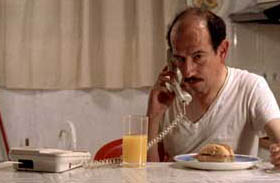Debut gives viewers the silent treatment.
Making an acute commentary about a national consciousness that is idled with a sort of poor man’s thinking ability that can dangerously numb a culture, Sangre is an examination into how the dulled down emotions lets the irrational creep into the rational and how a lack of communication in a consumerist society ultimately bares witness to a people who discard of their feelings like they dispose of hamburger wrappers.
With a rather intimate, plain-looking and to a certain extent naturally provocative style, Mexican filmmaker Amat Escalante plucks from the normalcy found in mundane daily rituals of low-income working class couples that populate most of his native country’s rural areas and best explores this condition by way of the filmmaker’s choice in his two leads. Most of the 365 days found in the lazy-eyed, pot-bellied protagonist are uneventful, even sexcapades with his wife come across as routine – but for a couple of X’s on the calendar there are some days that are much out of the ordinary. While the central point of the film in long take form does focus on such items as eating lunch or watching television soaps – there is the atypical response to a tragic situation that becomes a baffling and surprising statement about how daily ritual nullifies the notion of existence.
With a deliberate slow pacing that allows for an entire breakfast to be prepared, cooked, eaten and belched, Escalante’s minimalist menu is comprised of a series of still frame shots that cast an unromantic view upon the film’s subjects and their private lives. Void in the character’s emotions is best described in a sequence where a plastic dinner table is more of interest than the two naked bodies that used the surface as part of their playground. This fly-on-the-wall-ish visual choice is particularly stunning in appearance when it coldly describes how a person with no ability to feel deals with the situation that came about when his daughter reenters and then exits his life.
Restrained and dry in emotion, Escalante’s choice in the location for the film’s final resting place symbolical addresses the wasted society that his characters exist in. With the guidance of, among others Carlos Reygadas, Sangre belongs to a new breed of Mexican filmmakers who explore subject matters with off-center ideas – a shopping expedition at a hardware store or the shot of a male employee staring at a female co-workers’ panty line is partially humorous and partially haunting. Winner of the FIPRESCI prize in Cannes’ Un Certain Regard section, this comes highly recommended for those who like the Van Sants and the Kaurismäkis.
Montreal’s Festival of Nouveau Cinema 2005.
